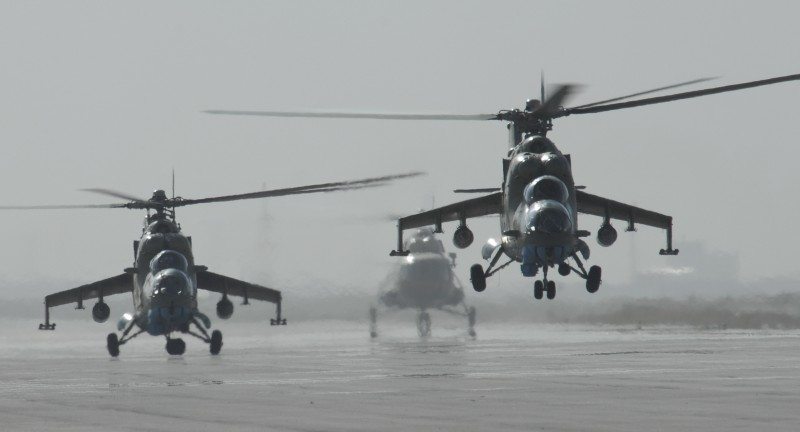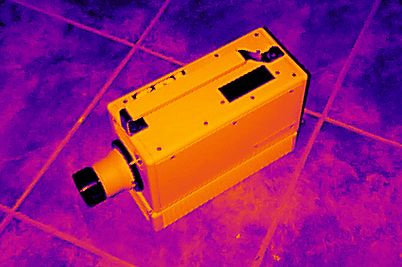Washington and Moscow traded accusations on Wednesday over arming the rivals in the Syrian conflict, as Damascus said it had “cleansed terrorists” from Al-Haffe, a Sunni enclave feared to be the target of a new massacre.
On the ground, meanwhile, at least 50 people were killed as troops and rebels clashed across the country, said the Syrian Observatory for Human Rights.
Due to what Moscow said was a mistake in translation, Russian Foreign Minister Sergei Lavrov appeared at first to accuse the United States of supplying weapons to rebels who are battling the regime of President Bashar al-Assad.
US Secretary of State Hillary Clinton said on Tuesday she had information that Russia was sending attack helicopters to Syria, “which will escalate the conflict quite dramatically.”
But Lavrov told a news conference during a brief visit to Iran that Russia was supplying “anti-air defence systems” to Damascus in a deal that “in no way violates international laws.”
“That contrasts with what the United States is doing with the opposition, which is providing arms to the Syrian opposition which are being used against the Syrian government,” he said, in remarks translated from Russian into Farsi by an official interpreter.
Other media, including Iran’s official IRNA news agency, published the same accusation, in what appeared to be the first time Moscow had directly pointed the finger at Washington.
But in Moscow, the foreign ministry said Lavrov’s statement was mistranslated and that the minister had only said Washington was supplying arms “in the region.”
The White House, meanwhile, denied arming Syria’s opposition.
“We do not and have not supplied weapons to the Syrian opposition,” White House spokesman Jay Carney said.
Russian news agencies offered a different version of Lavrov’s comments.
“We do not supply — neither to Syria nor anywhere else — things used to fight peaceful civilians, unlike the United States, which regularly supplies such special equipment to this region,” Lavrov was quoted as saying.
“Just recently, one such shipment was made to one of the Persian Gulf nations. But for some reason, the Americans treat this as par for the course,” Russia’s state-run RIA Novosti news agency quoted him as saying.
For her part, Clinton stuck by the concerns she had expressed on Tuesday about the “continuing military relationship between Moscow and the Assad regime,” adding that “we have repeatedly urged the Russian government to cut these military ties completely and to suspend all further support and deliveries.”
“We believe that the situation is spiraling towards civil war and it’s now time for everyone in the international community — including Russia and all Security Council members — to speak to Assad with a unified voice and insist that the violence stop,” Clinton said.
For its part, France called for a “complete halt” of arms exports to Syria, in a veiled charge against Russia, which last year sold almost $1 billion of weapons to Syria, according to campaign group Avaaz.
“We are calling for a complete halt to arms exports to the Syrian regime as asked by joint United Nations-Arab League envoy Kofi Annan before the Security Council last week,” foreign ministry spokesman Bernard Valero said.
Foreign Minister Laurent Fabius said: “Our intelligence, direct and indirect, shows that there are deliveries.”
Meanwhile, the rebel Free Syrian Army said its fighters pulled out of Al-Haffe in a tactical move to spare civilians of the beleaguered northwestern town after an eight-day regime bombardment.
As the conflict spiralled to vicious new heights, Turkey reported that 2,500 Syrians had fled across its border in 48 hours, saying numbers had increased amid attacks even targeting UN observers.
State media said government forces overran Al-Haffe, a day after UN observers came under fire trying to reach the town after the UN and opposition activists expressed fears a massacre could be in the offing.
“Security and calm were restored in the area of Al-Haffe which was cleansed after armed terrorist groups assaulted citizens and vandalised and burned a number of public and private properties,” SANA said.
Expressing surprise at an assessment by the UN peacekeeping chief that a sharp escalation in violence had changed the nature of the 15-month conflict, Syria said UN officials should remain “neutral, objective and precise”.
“Talk of civil war in Syria is not consistent with reality … What is happening in Syria is a war against armed terrorist groups,” the foreign ministry said.
It urged regional and international powers to “stop any military or financial support for terrorist groups” operating in Syria, and urged the UN to take a “decisive stand against the crimes committed by armed groups.”
Asked on Tuesday whether he believed Syria was in a civil war, UN peacekeeping chief Herve Ladsous said: “Yes I think we can say that. I think there is a massive increase in the level of violence, so massive indeed that in a way it indicates some change of nature.”
The Syrian government, which is dominated by Assad’s Alawite offshoot of Shiite Islam, has refused to acknowledge an uprising that erupted in March 2011 inspired by the Arab Spring.
It consistently refers to the Free Syrian Army and other armed groups as “terrorists” and has accused Washington and its regional allies of complicity in their operations.
Stepping up the pressure on the Assad regime, France’s Fabius said he would contact allies to draw up tougher sanctions against his top brass.
He added that France plans to ask the UN Security Council to make Annan’s peace plan “obligatory” under the UN Charter’s Chapter VII, which allows measures to be imposed on countries under penalty of sanctions or the use of force.











